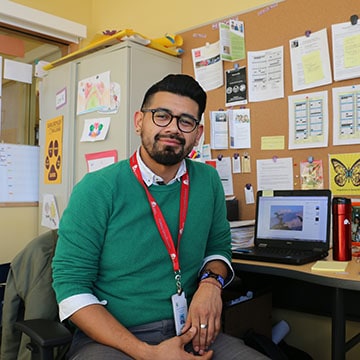“I brought some pictures,” Josette Herrera says, handing her cell phone to Josué Peña-Juárez. He grimaces as he looks at the black mold that just keeps coming back around the windows in Herrera’s apartment. The two have talked about it before, but Herrera has had trouble getting her landlord to address the problem.
“I’m worried about my kids,” Herrera says. One of her sons had pneumonia this year and she fears the mold is impacting her family’s health.
As the new Family Resource Navigator at Earl Boyles Elementary School, Peña-Juárez has many meetings like this – with families who need advice, support, or access to a wide variety of services. From housing support to counseling, from legal help to clothing and food, Peña-Juárez helps families find whatever it is they need. “I never say, ‘you can’t ask me about that,'”; he says.
The Family Resource Navigator position, which Peña-Juárez was hired to fill in November, is the only position of its kind at a public school in Multnomah County. Funded by the county and staffed by SUN (which is operated at Earl Boyles by Metropolitan Family Service), the Family Resource Navigator role is an innovative demonstration of what can happen when an elementary school also serves as a neighborhood hub. The role was created as part of the Early Works initiative at Earl Boyles because academic success for young children is dependent on a wide variety of factors that go well beyond what schools traditionally support.
“The family and community contexts are incredibly important to ensure kids reach academic benchmarks,” says Dana Hepper, Children’s Institute’s Director of Policy and Program. “We worked with our partners to pilot the Family Resource Navigator role because integrating health and family support with education is so much more effective than having three separate siloes.”
Peña-Juárez has been on the job for just three months, but the impact is clear already. “Folks are coming forward and saying, ‘I need this support,'” he says. “That means that they already trust. They understand that someone is here and responsive.”
As a parent at the school, Herrera is very glad that Peña-Juárez is there. After a previous meeting with him, she went to a local workshop and learned about how to document her mold problem and submit the documentation to her landlord. This time around, she and Peña-Juárez discuss drafting a letter and going to the post office together to send it using certified mail.
“There are a lot of resources out there that a lot of people don’t know [about],” Herrera says. The workshop to empower renters is just one example.
Peña-Juárez’s goal is not just to help Earl Boyles families in need. “I want more families to be engaged with the school,” he says.
He sees that many parents have ideas and strengths to share, and trust and communication are key to tapping these strengths.
Earl Boyles SUN Site Manager Youn Han is Peña-Juárez’s supervisor. “He’s been able to provide a lot of capacity around family stabilization,” she says. “He does intensive work and builds meaningful connections with families.”
Everyone involved is hopeful that other schools in other communities will learn from the demonstration. The Children’s Institute is working closely with Peña-Juárez to track how he spends his time and how his work complements and builds on other Early Works strategies.
This gives us information we can share with others around the state at multiple levels. We are not just learning what a Family Resource Navigator position looks like on the ground; we are also evaluating what impact this strategy has in driving towards key Early Works outcomes.
“I hope that eventually there will be a team of [Family Resource Navigators] at other school sites so that we would meet and coordinate our resources,” he says.
He also hopes to train people within the community to take over the role in the long-term. “They’re from here. They’ve invested time and energy in the community. We can support them in getting some skills and then have them in positions like this one,” Peña-Juárez says.
 Peña-Juárez’s most important advice for other schools looking to create a Family Resource Navigator position is to hire someone who can speak the language and understand the culture of the families in the community. At Earl Boyles, where a large number of families speak Spanish at home, Peña-Juárez’s bilingual skills and cultural background are critical.
Peña-Juárez’s most important advice for other schools looking to create a Family Resource Navigator position is to hire someone who can speak the language and understand the culture of the families in the community. At Earl Boyles, where a large number of families speak Spanish at home, Peña-Juárez’s bilingual skills and cultural background are critical.
Han agrees that it’s very important to hire the right person. “The Family Resource Navigator position is really dependent on families trusting that person,” she says. “Choose someone trustworthy, a good communicator, and preferably someone who is already familiar with or part of the community.”
Herrera also agrees. “Having [Peña-Juárez] here has helped a lot, especially him being bilingual,” she says. “He understands and he’s not judgmental.”
Both Peña-Juárez and Han emphasized that the role must be part of a larger school culture that is open and compassionate.
“Earl Boyles is such a great school because everyone from the administration and principal to the teachers and staff supports making communication as open as possible,” Han says.
